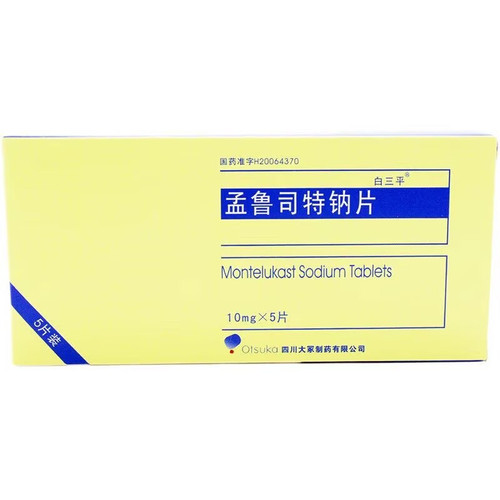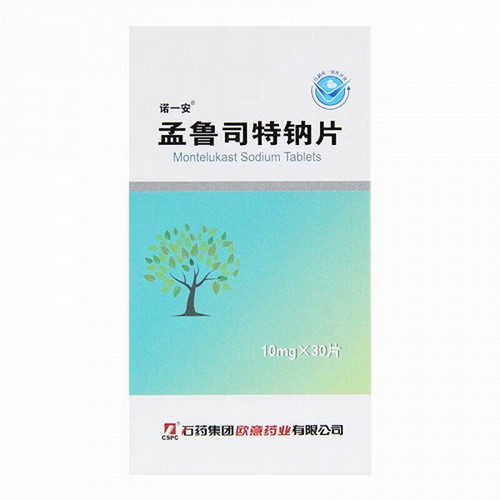Product Overview
【Drug name】
Common name: Montelukast sodium tablets
Product name: Dushumonlukast sodium tablets 10mg*5 tablets
Full Pinyin Code: DuShu MengLuSiTeNaPian 10mg*5Pian
【Main ingredients】
The main ingredients of this product are Montelukast sodium. Chemical name: [R-(E)]-1-[1-{3-[2-7-chloro-2-quinoline)vinyl]phenyl]-3-{2-(1-hydroxy-1-methylethyl)phenyl]propyl]sulfur]methyl]cyclopropaneacetic acid
sodium. Molecular formula: C35H35CINNaO3S Molecular weight: 608.18
【Traces】
This product is a film-coated tablet, which looks white or white like after removal of coating.
【Indications/Indications Function】
This product is suitable for the prevention and long-term treatment of asthma in adults aged 15 and over, including the prevention of asthma symptoms during the day and at night, the treatment of asthma patients who are sensitive to aspirin, and the prevention of exercise-induced bronchial contraction. This product is suitable for allergic rhinitis (seasonal allergic rhinitis and perennial allergic rhinitis in adults aged 15 and over).
【Specifications and Models】
10mg*5 tablets
【Usage and dosage】
Once a day, one tablet (10mg). Asthma patients should take it before going to bed. Patients with allergic rhinitis can take medication when needed according to their own situation. Patients with asthma and allergic rhinitis should take medication once a night. Adult patients aged 15 and over with asthma and/or allergic rhinitis are 10 mg once a day. It is generally recommended to use asthma control indicators to evaluate the therapeutic effect, and the efficacy of this product appears within one day of the medication. This product can be taken together with the food or separately. Patients should be advised to take it in both asthma control and worsening stages. Dosage adjustment is not required for elderly patients, patients with renal insufficiency, patients with mild to moderate liver damage, and patients of different genders. The relationship between Montelukast sodium tablets and other asthma treatment drugs This product can be added to the existing treatment plan of the patient. Reduce the dosage of combined medication: Asthma patients who cannot effectively control bronchodilator alone can add this product to the treatment plan. Once there is a significant clinical efficacy response (usually after the first dose of medication), the dose of bronchodilator can be reduced according to the patient's tolerance. After adding this product to asthma patients receiving inhaled glucocorticoid treatment, the dose of glucocorticoid can be appropriately reduced according to the patient's tolerance. The amount should be gradually reduced under the guidance of a doctor. Some patients can gradually reduce the dose until the inhaled glucocorticoid is completely stopped. However, this product should not be used to suddenly replace inhaled glucocorticoids.
【Adverse reactions】
This product is generally well tolerated, with mild adverse reactions and usually does not require termination of treatment. The overall incidence of adverse reactions in this product is similar to that in placebo. Patients with asthma aged 15 and over 15 have conducted clinical studies in about 2,600 adult asthma patients aged 15 and over 15 years old to evaluate the safety of the original Montelukast sodium tablets. In two similar, placebo-controlled 12-week clinical studies, the drug-related incidence rate in the original montelukast sodium tablets treatment group was ≥1% and higher adverse events than in the placebo group were abdominal pain and headache. However, the incidence of these adverse events did not differ significantly between the two groups. In clinical studies, a total of 544 patients have been treated with original Montelukast sodium tablets for at least 6 months, 253 patients have been treated for 1 year, and 21 patients have been treated for 2 years. As the treatment time was extended with the original Montelukast sodium tablets, the occurrence of adverse events did not change. Patients with seasonal allergic rhinitis aged 15 and over have conducted clinical studies in 2,199 adult patients with seasonal allergic rhinitis aged 15 and over 15 years old to evaluate the safety of original Montelukast sodium tablets. Taking original montelukast sodium tablets every morning or at night is well tolerated, and the incidence of adverse reactions is similar to taking placebo. In placebo-controlled clinical studies, no drug-related incidence was found in the original montelukast sodium tablet treatment group, and it was higher than that in the placebo group. In a 4-week placebo-controlled clinical study, the safety was consistent with the 2-week clinical study. In all clinical studies, the incidence of lethargy was similar to that of the placebo group. Perennial allergic rhinitis aged 15 and over has been present in 3235 adults aged 15 and over.
Two six-week placebo-controlled clinical studies were conducted in patients with allergic rhinitis to evaluate the safety of original montelukast sodium tablets. The original Montelukast sodium tablets were well tolerated once a day, and the incidence of adverse reactions was similar to that of the placebo group, and consistent with the clinical results of seasonal allergic rhinitis. In both clinical studies, the incidence of adverse events in the treatment group was less than 1%, and no drug-related adverse events were found, with a higher incidence than in the placebo group. The incidence of lethargy was similar to that of the placebo group. Collective analysis of clinical practice A combined analysis of 41 placebo-controlled clinical studies (35 studies in patients aged 15 and older; 6 studies in pediatric patients aged 6-14 years) were performed using effective suicide behavior assessment methods. Among the 9929 patients taking original Montelukast sodium tablets and 7780 patients taking placebo, one patient with suicidal ideation took original Montelukast sodium tablets. None of the groups had completed suicide, suicide attempts, or prepared actions against suicide. Independent co-analysis was conducted on 46 placebo-controlled clinical studies (35 studies were conducted on patients aged 15 and older; 11 studies were conducted on pediatric patients aged 3 months to 14 years old) to evaluate behavior-related adverse events. Among 11,673 patients taking original montelukast sodium tablets and 8,827 patients taking placebo, the incidence of behavior-related adverse events was 2.73% and 2.27%, respectively; the odds ratio was 1.12 (95% Cl [0.93; 1.36). The clinical trials included in these combined analyses did not have a specific examination of suicide rates or behavior-related adverse events. Experience after marketing Original Montelukast sodium tablets have the following adverse reaction reports after they are on the market: infection and infection: upper respiratory tract infection. Blood and lymphatic system disorders: increased bleeding tendency, thrombocytopenia. Immune system disorders: including hypersensitivity reactions of allergic reactions, very rare hepatic eosinophil infiltration. Mental system disorders: including aggressive behavior or hostile excitement, anxiety, depression, loss of directional perception, inattention, abnormal night dreams, stuttering (stuttering), hallucination, insomnia, memory impairment, obsessive-compulsive symptoms, psychomotor hyperactivity (including irritability, irritability and tremor), sleepwalking, suicide thoughts and behaviors (suicide), convulsions. Neurological disorders: dizziness, lethargy, sensory abnormalities/tactile depression and very rare epilepsy seizures. Heart disorder: palpitations. Respiratory, chest and mediastinal disorders: epistaxis; pulmonary eosinophilia. Gastrointestinal disorders: diarrhea, indigestion, nausea, pancreatitis, vomiting. Hepatobiliary disorders: elevated ALT and AST, very rare hepatitis (including cholestatic, hepatocytes and mixed liver damage). Skin and subcutaneous tissue disorders: angioedema, contusion, erythema pleomorpha, erythema nodular, itching, rash, Stevens-Johnson syndrome/toxic epidermal necrolysis, urticaria. Musculoskeletal and connective tissue disorders: arthralgia, including myalgia that is cramped by muscles. Renal and urinary disorders: Enuresis in children (occasionally). Other disorders and dosing sites: weakness/fatigue, edema, fever.
【Forbidden Taboos】
It is prohibited for those who are allergic to any ingredients in this product.
【Precautions】
The efficacy of oral administration of this product in treating acute asthma attacks has not been determined. Therefore, it is not used to treat acute asthma attacks. Patients should be informed to prepare appropriate rescue medication. Although the dose of inhaled glucocorticoids used in combination can be gradually reduced under the guidance of a physician, this product does not apply to a sudden replacement of inhaled or oral glucocorticoids. In patients receiving anti-asthma drugs including leukotriene receptor antagonists, in rare cases, one or more of the following conditions: eosinophilia, vascular rash, worsening of lung symptoms, cardiac complications and/or neuropathy (sometimes diagnosed as Churg-Strauss syndrome—a systemic eosinophilic vasculitis). These conditions are sometimes associated with a reduction or discontinuation of oral glucocorticoid therapy. Although the causal relationship between these conditions and leukotriene receptor antagonists has not been determined, it is recommended that patients taking this product be careful and appropriate clinical monitoring are carried out. Patients with rare hereditary galactose intolerance, lactase deficiency, or glucose-galactose malabsorption cannot take this medication. Montelukast may have no or minor effects on the ability to drive and operate the machine. However, there are reports of individual drowsiness and dizziness. It is reported that adults, adolescents and pediatric patients taking original Montelukast sodium tablets may experience neuropsychiatric events. Post-market reports on original Montelukast sodium tablets include excitement, aggressive behavior or hostility, anxiety, depression, dysdirectional disorders, attention disorders, abnormal dreams, stuttering (stuttering), hallucination, insomnia, irritability, memory deficits, obsessive-compulsive symptoms, restlessness, sleepwalking, suicidal thoughts and behaviors (including suicide), convulsions, and tremors. Some post-market reports on original Montelukast sodium tablets
The clinical details appear to be consistent with the effects caused by the drug. Patients taking original Montelukast sodium tablets have reported psychiatric neurological events (see adverse reactions). Since other factors may also lead to these events, it is not possible to confirm whether it is related to the original Montelukast sodium tablets. The doctor should discuss these adverse events with the patient and/or the caregiver. The patient and/or nursing staff should be informed that if these conditions occur, the doctor should be notified. Patients who are sensitive to aspirin should continue to avoid using aspirin or non-steroidal anti-inflammatory drugs when taking this product.







